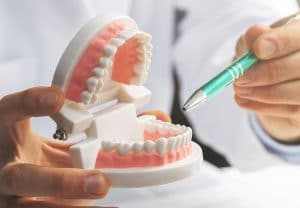 Not all tooth replacement options are the same. For some people, the best solution is to replace a lost tooth, or multiple adjacent teeth, with a custom-designed dental bridge. For others, the dispersed nature of their lost teeth means they’ll need a partial denture to successfully fill the gaps in their smiles. However, what many dental restorations share in common is a need for dental implants to more closely resemble the root can crown structures of your healthy teeth. Dental implants are often better at replacing lost teeth because the loss of the tooth’s is essential to restoring your smile.
Not all tooth replacement options are the same. For some people, the best solution is to replace a lost tooth, or multiple adjacent teeth, with a custom-designed dental bridge. For others, the dispersed nature of their lost teeth means they’ll need a partial denture to successfully fill the gaps in their smiles. However, what many dental restorations share in common is a need for dental implants to more closely resemble the root can crown structures of your healthy teeth. Dental implants are often better at replacing lost teeth because the loss of the tooth’s is essential to restoring your smile.
They have roots like natural teeth
The only real difference between implant restorations and conventional ones is that the former has a series of root-like posts to support it. Dental implants mimic healthy, natural roots in the way they support your teeth, which has several important implications for the results of your smile restoration. By giving your replacement teeth an appropriate number of dental implant posts to rest on, you can more closely mimic the natural structures of your teeth. Most importantly, you can give it roots that not only support your bite function, but also help you preserve your smile’s foundation more effectively.
They make your restoration more stable
One of the more immediate ways in which dental implants excel at restoring smiles is the enhanced stability they provide when you bite and chew with your restoration. The quality of your replacement teeth can be largely gauged by how well they perform and allow you to eat a variety of foods. By mimicking your natural teeth roots, dental implants anchor your replacement teeth to your dental ridge, creating a higher level of stability than traditional dental bridges and dentures are able to provide.
They can keep your jawbone stronger
The main functions of your teeth can largely be restored with a conventional dental bridge or denture, and for some patients, there is no need to undergo treatment to receive dental implants. However, the interaction between your natural teeth and your supportive jawbone structure is something that can’t be reestablished without the help of one or more dental implants. This interaction includes the stimulation that your teeth roots provide your jawbone when you bite and chew. By restoring this connection, dental implants can help prevent your jawbone structure from growing weaker and less dense that can result from a lack of stimulating roots.
Learn more about dental implants
Dental implants are designed to give your restoration the support and stability that it needs to function more like healthy, natural teeth. To learn more, schedule an appointment with us by calling Dreem Dentistry in Leawood, KS, today at 913-681-5500. We also serve patients who live in Overland Park and all surrounding communities.






